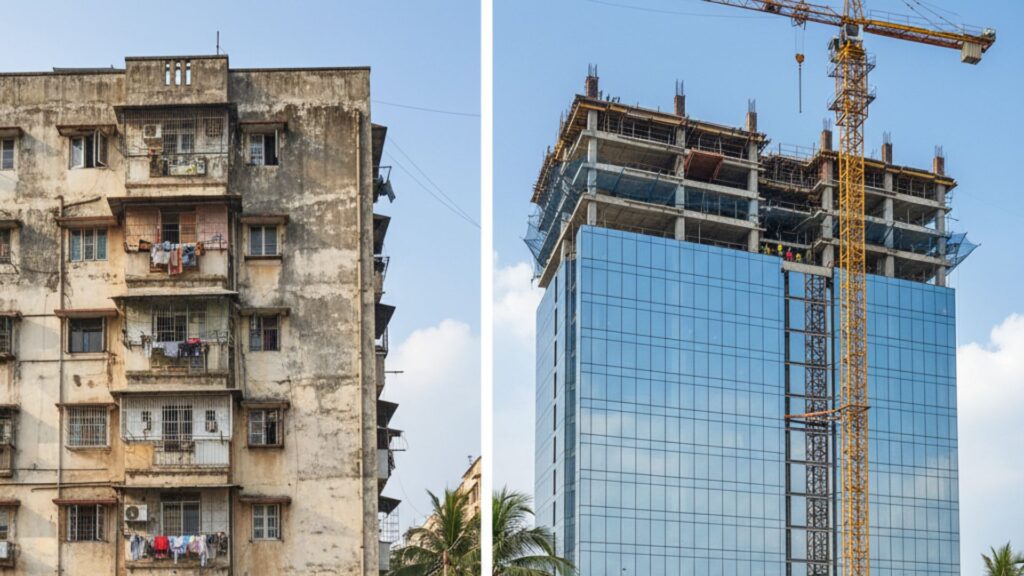India’s cities are changing quickly. With more people moving to urban areas, the need for better housing and infrastructure is growing. However, in many cities, there is very little open land left for new construction. This is where redevelopment projects are becoming important.
Redevelopment focuses on rebuilding old and worn-out buildings instead of expanding into new areas. This approach helps improve the quality of housing while making better use of the land already available. Cities like Mumbai, Bengaluru, Pune, and Delhi are seeing a steady rise in such projects, benefiting both residents and developers.

Table of Contents
What Is Redevelopment?
Redevelopment is the process of tearing down old buildings and replacing them with new, modern structures.
For example, many housing societies built decades ago may no longer be safe or have enough facilities. Through redevelopment, these old structures are replaced with stronger buildings that have proper parking, elevators, and other basic amenities.
This approach not only improves the living space but also upgrades the overall look and safety of the neighborhood.
Why Redevelopment Is Becoming Common
Several reasons are driving the growth of redevelopment projects in India:
1. Limited Land in Cities
In busy cities, finding large open plots for new buildings is very difficult. Redevelopment allows construction to happen in the exact location where people already live and work.
2. Old and Unsafe Buildings
Many buildings are 30 to 50 years old and may not meet today’s safety standards. Redevelopment helps replace these unsafe structures with stronger, better-planned ones.
3. Better Use of Available Space
Older buildings often have fewer floors and limited facilities. Redevelopment allows for taller buildings that can house more families and offer improved facilities.
4. Government Policies
Many local authorities support redevelopment by providing relaxed rules and incentives, making it easier for housing societies and builders to work together.
5. Improved Living Conditions
Modern redevelopment projects usually include basic and useful facilities like proper parking, security, and open areas for residents.
Benefits of Redevelopment
Redevelopment brings value to different groups of people:
| Group | Benefits |
|---|---|
| Residents | Safer homes, better amenities, and often bigger flats |
| Developers | Access to well-located land for new projects |
| City Planners | Improved infrastructure and use of limited space |
| Investors | Good resale and rental value in prime areas |
Challenges in Redevelopment
Redevelopment has its share of challenges, which need careful handling:
- Getting Everyone’s Agreement: It takes time for all residents to agree on redevelopment plans.
- Permission Process: Getting approvals from local authorities can be slow and complicated.
- Financial Planning: Builders need significant funds to start and complete projects.
- Temporary Relocation: Residents may need to move elsewhere until construction is done.
Clear communication and proper planning can help solve many of these issues.
Cities Leading in Redevelopment
Some cities are seeing faster growth in redevelopment because of their population size and land limitations:
- Mumbai: Redevelopment is very common here, especially in old housing societies and chawls.
- Bengaluru: Older neighborhoods are being rebuilt to meet the needs of a growing IT workforce.
- Pune: Redevelopment is focused on older areas near the city center.
- Delhi NCR: Many old residential complexes are being replaced with modern buildings.
- Chennai and Hyderabad: Traditional localities are being upgraded with better infrastructure.
The Future of Redevelopment
As cities grow, redevelopment will play a key role in improving housing and infrastructure. Government rules like RERA are helping bring transparency to the process, making it easier for residents and developers to work together.
In the future, redevelopment will help cities become more organized and better prepared for the growing population.
Conclusion
Redevelopment is becoming an important part of city planning in India. It solves two big problems: lack of open land and aging buildings.
For residents, it brings safer homes and better facilities. For developers and investors, it opens opportunities in prime city locations. With proper planning, redevelopment can help create better neighborhoods and a stronger urban future.
Frequently Asked Questions
Q. What is redevelopment in real estate?
Redevelopment in real estate means demolishing old or unsafe buildings and constructing new ones in the same place. It helps improve safety, living standards, and the overall look of the area without needing new land.
Q. Why is redevelopment important in cities?
Redevelopment is important because many urban buildings are decades old and no longer meet safety or space needs. It also helps make better use of limited land in crowded cities.
Q. Who benefits from redevelopment projects?
Residents get safer homes with better amenities, developers gain access to prime city locations, and cities benefit from improved infrastructure and planning.
Q. What challenges are involved in redevelopment?
Common challenges include getting approval from all residents, securing government permissions, arranging finances, and managing temporary relocation during construction.